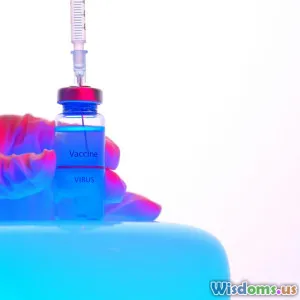
The Impact of Biotechnology on Disease Management
8 min read Explore how biotechnology revolutionizes disease management through innovations in diagnosis, treatment, and prevention. (0 Reviews)
The Impact of Biotechnology on Disease Management
Biotechnology, once confined to the realm of theoretical science, now stands as one of the most transformative forces reshaping healthcare worldwide. With breakthroughs in genetic engineering, molecular diagnostics, and therapeutic development, this discipline is fundamentally altering how diseases are detected, treated, and prevented.
Introduction: Where Biology Meets Innovation
Imagine a world where diseases are predicted before symptoms arise, therapies are tailored specifically to your genetic makeup, and once-lethal illnesses become manageable chronic conditions or simply eradicated. This vision is not distant futurism — it is the rapidly unfolding reality driven by advancements in biotechnology.
The global disease management landscape faces challenges such as emerging infectious diseases, antibiotic resistance, and the rise of chronic conditions like cancer and diabetes. Biotechnology solutions offer powerful tools to address these issues at their root cause, often with precision and efficiency unavailable to conventional approaches.
Revolutionizing Diagnosis with Molecular Technologies
Precise, Early Detection Saves Lives
Early and accurate diagnosis remains a cornerstone of effective disease management. Traditional methods often rely on symptomatic observation and general lab tests, which can delay treatment initiation.
Biotechnology introduces molecular diagnostics — techniques that detect diseases based on biomarkers such as DNA, RNA, and proteins. These technologies identify infections, genetic mutations, or cancer markers quickly and with high sensitivity.
For instance, the Polymerase Chain Reaction (PCR) revolutionized the detection of infectious agents like HIV and SARS-CoV-2 by amplifying tiny segments of genetic material, enabling diagnosis even when pathogen load is minimal. Recent rapid PCR-based tests facilitate same-day COVID-19 diagnosis, demonstrating biotechnology's role in pandemic control.
Liquid Biopsies and Disease Monitoring
An emerging advancement involves liquid biopsies, where circulating tumor DNA (ctDNA) in blood samples is analyzed to detect cancers early and monitor treatment response. Unlike invasive tissue biopsies, liquid biopsies offer a less painful alternative and can track evolving tumor genetics in real time.
This technology is particularly impactful in oncology, where understanding tumor mutations guides therapy selection — a key benefit holistic disease management.
Targeted and Personalized Treatments
From One-Size-Fits-All to Precision Medicine
Conventional treatments often apply blanket approaches with variable outcomes and adverse side effects. Biotechnology enables personalized medicine, tailoring therapies based on individual genetic profiles.
Targeted therapies have emerged strongly in treating diseases like cancer. Drugs designed to inhibit specific mutated proteins involved in tumor growth — such as imatinib for chronic myeloid leukemia — have dramatically improved survival rates.
Gene Therapy: Fixing Causes, Not Symptoms
One of biotechnology's most exciting frontiers is gene therapy, where defective genes causing diseases can be replaced, silenced, or repaired. For example, in spinal muscular atrophy, a fatal genetic disorder, gene therapy using onasemnogene abeparvovec has transformed patient outcomes, turning a once terminal diagnosis into manageable care.
Such approaches aim at curing diseases rather than only managing symptoms, shifting paradigms in clinical practice.
Immunotherapy and Biologics
Biotechnology also fosters the development of immunotherapies that harness the body's immune system to fight cancers and autoimmune disorders. Checkpoint inhibitors and CAR-T cell therapies are prime examples showing notable success in previously treatment-resistant malignancies.
Biologics, including monoclonal antibodies and recombinant proteins, are creating targeted approaches for inflammatory diseases like rheumatoid arthritis or multiple sclerosis, reducing global disease burden.
Disease Prevention and Control Through Biotech Innovation
Vaccines: Precision and Beyond
Vaccination remains the most cost-effective way to prevent infectious diseases. Traditional vaccine development, however, is often time-consuming.
Biotechnology expedites this process, as seen with mRNA vaccines developed against COVID-19. These vaccines utilize genetic blueprints to teach immune cells to recognize pathogens without exposure to the actual virus. Their rapid design and high efficacy set a new standard for combating infectious threats.
Diagnostic Tools in Epidemiology
Biotech tools enable genomic surveillance of pathogens, identifying mutations that could impact transmissibility or vaccine effectiveness. This real-time monitoring supports quick public health responses.
Addressing Antimicrobial Resistance
Biotechnology also lends insight into combating antibiotic resistance by engineering bacteriophages or designing novel antimicrobial peptides. Such innovations are vital to managing the looming global threat of resistant infections.
Real-World Impacts: Case Studies
- HIV Management: The identification of viral load through PCR enabled personalized treatment adjustments, dramatically lowering morbidity and transmission.
- Oncology: Targeted drugs like trastuzumab improved breast cancer therapies by binding specifically to HER2-positive tumor cells while sparing healthy tissue.
- Sickle Cell Disease: CRISPR gene-editing technologies are currently in trials to correct the mutation driving this genetic disorder, offering hope for a permanent cure.
Challenges and Ethical Considerations
While biotechnology offers immense promise, challenges persist:
- Cost and Accessibility: High costs may restrict cutting-edge therapies to affluent regions, exacerbating global health disparities.
- Ethical Issues: Gene editing and cloning raise moral questions, including concerns about unintended consequences and genetic privacy.
- Regulatory Landscape: Ensuring safety while accelerating innovation requires balanced regulatory frameworks.
Addressing these challenges requires collaborative efforts among scientists, policymakers, and society to maximize benefits responsibly.
Conclusion: Towards a Healthier Future
Biotechnology is no longer a niche scientific pursuit but a pivotal contributor to modern medicine, reshaping how diseases are understood and controlled. From early diagnosis to personalized therapies and preventive tools, its impact on disease management is profound and expanding rapidly.
As research advances and accessibility improves, the potential to transform healthcare delivery and improve quality of life worldwide is immense. Patients and healthcare providers alike stand to benefit from embracing biotechnology-driven innovations, which herald a future where precision, speed, and efficacy define disease management strategies.
The ongoing revolution in biotechnology represents an extraordinary blend of scientific ingenuity and compassionate care — a beacon guiding us toward better health for all.
Rate the Post
User Reviews
Popular Posts



















